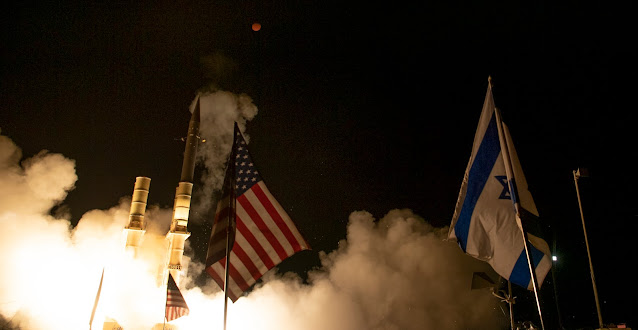Iran will soon have access to sharp orbital imagery, thanks to a newly launched spy satellite.That spacecraft, called Khayyam, lifted off atop a Russian Soyuz rocket today (Aug. 9) at 1:52 a.m. EDT (0552 GMT) from the Russia-run Baikonur Cosmodrome in Kazakhstan.Khayyam, which is named after the famed Persian poet and mathematician Omar Khayyam, is a Russian-built Kanopus-V Earth-observation satellite that can resolve features as small as 3.9 feet (1.2 meters) on Earth's surface, The Washington Post reported last week."Potentially the most significant benefit," the newspaper added, citing unnamed Western security officials, "will be Iran’s ability to 'task' the new satellite to conduct continuous surveillance on locations of its choosing, including military facilities in Israel, oil refineries and other vital infrastructure in neighboring gulf states."
Israel’s planned Arrow-3 high-altitude ballistic missile defense system could relatively easily be adapted to destroy Iranian spy satellites if and when Tehran manages to deploy high-resolution orbiting vehicles, military space experts here say.“At the moment, Israel enjoys tremendous superiority in space vis-à-vis its Arab and Islamic neighbors. But it is worthwhile to address ASAT (anti-satellite) technological and political issues in case such operations will be needed in the future,” said TalI Inbar, head of the Space Research Center at the Fisher Institute for Air and Space Strategic Studies.The agile, exoatmospheric, hit-to-kill Arrow-3 interceptor being developed by Israel Aerospace Industries (IAI) of Lod, Israel, and Chicago-based Boeing Co. is inherently multirole, and could be adapted, if needed, for A-Sat roles, said retired Maj. Gen. Yitzhik Ben-Israel, chairman of the Israel Space Agency.“If there’s a threat from space, a logical answer is the Arrow upper tier” system, said Ben-Israel, a former director of Israeli military research and development.In a rare public acknowledgement of Israeli interest in the A-Sat mission, a Tel Aviv University workshop, co-sponsored by Israel’s Ministry of Defense and leading de-fense firms, included a presentation on space warfare that alluded to Israel’s ability to blast orbiting spacecraft much in the way that the United States in early 2008 used an Aegis ship-based Standard Missile-3 interceptor to destroy a wayward U.S. satellite. The Nov. 3 workshop was entitled “Israeli Space: Crisis or Opportunity.”“It’s proven that an anti-ballistic missile system capable of operating at higher altitudes like the SM-3 also will have the ability to shoot down low-Earth orbiting satellites,” Yair Ramati, IAI’s corporate vice president for marketing, told participants at the workshop.Ramati, a leading Israeli missile engineer and former Arrow program director, told workshop participants that security restrictions prevented him from discussing how Israeli systems, such as the Green Pine radar, could track satellites. “Most of the radars used to track surface-to-surface missiles are also capable of tracking objects in space,” he said.
outside the Earth’s atmosphere, the Defense Ministry said.The trial tested a number of “breakthrough” capabilities for the missile defense system, which can be used immediately by the Israeli Air Force, the Defense Ministry’s Missile Defense Organization head Moshe Patel told reporters on Tuesday.“We have made a breakthrough in every part of the system, in the detection arrays, in the launches, even in the interceptors themselves, so that they match the threats that are expected in the region. There were highly, highly significant technological breakthroughs here that were assessed and can be used by the air force in its operational systems immediately,” Patel said.Boaz Levy, the president and CEO of the Israel Aerospace Industries, which manufactures the Arrow 3, said the breakthroughs were principally in the area of “algorithms,” the ways in which the systems detect incoming threats and calculate launch trajectories for interceptors.“I won’t elaborate, but it gives the system more capabilities in dealing with threats,” Levy told reporters.
|
Or order from your favorite bookseller, using ISBN 9798985708424. Read all about it here! |

|

 Elder of Ziyon
Elder of Ziyon























